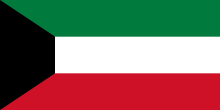The Kuwait Portal Kuwait, officially the State of Kuwait, is a country in West Asia and the geopolitical region known as the Middle East. It is situated in the northern edge of the Arabian Peninsula at the head of the Persian Gulf, bordering Iraq to the north and Saudi Arabia to the south. With a coastline of approximately 500 km (311 mi), Kuwait also shares a maritime border with Iran, across the Persian Gulf. Most of the country's population reside in the urban agglomeration of Kuwait City, the capital and largest city. As of 2024, Kuwait has a population of 4.82 million, of which 1.53 million are Kuwaiti citizens while the remaining 3.29 million are foreign nationals from over 100 countries. Kuwait has the third largest foreign-born population in the world. Before the discovery of oil reserves in 1938, the country was a regional trade port; from 1946 to 1982, the country underwent large-scale modernization, largely based on income from oil production. In the 1980s, Kuwait experienced a period of geopolitical instability and an economic crisis following the stock market crash. In 1990, Kuwait was invaded and subsequently annexed by Iraq under the leadership of Saddam Hussein following disputes over oil production. The Iraqi occupation of Kuwait ended on 26 February 1991, after an American-led international coalition expelled Iraqi forces from the country during the Gulf War. Like most other Arab states of the Persian Gulf, Kuwait is an emirate; the emir is the head of state and the ruling Al Sabah family dominates the country's political system. Kuwait's official state religion is Islam, specifically the Maliki school of Sunni Islam. Kuwait is a high-income economy, backed by the world's sixth largest oil reserves. (Full article...) Selected article - The petroleum industry in Kuwait is the largest industry in the country, accounting nearly half of the country's GDP. Kuwait has proven crude oil reserves of 104 billion barrels (15 km3), estimated to be 9% of the world's reserves. Kuwait's oil reserves are the sixth largest in the world and the Burgan Field is the second largest oil field. Kuwait is the world's eleventh largest oil producer and seventh largest exporter. Kuwait's oil production accounts for 7% of world-wide oil production. Since the government of Kuwait owns the petroleum industry, it controls a lot of the country's economy; in all, about 43 percent of the GDP. Kuwait’s oil exports vary depending on internal needs – almost all of Kuwait’s energy is derived from oil – and on international demand and prices and production quotas fixed by the OPEC, of which Kuwait is a member. OPEC’s quotas, however, are difficult to enforce, and Kuwait and other countries have been accused of violating them. In 2005, oil production was an estimated 2.418 million bbl/day. (Full article...) Did you know...
Related portalsReligions in Kuwait Arab states Other countries TopicsWikiProjectsAssociated WikimediaThe following Wikimedia Foundation sister projects provide more on this subject:
Discover Wikipedia using portals
|
Aja viide. Aja lugu.
Ilm, huumor ja uudiseid
Värsked postitused
- VIDEO: Prantsusmaal lõppes Ukraina pilootide koolitus
- VIDEO: süvaveekala nähti Kanaaride juures mere pealmistes kihtides
- Tanel Tammet: rumal tehisaru peletab eestlased võõrasse kultuuriruumi
- Varude keskuse andmetel on kogu Tallinna peale ainult üks avariitankla
- Baskonia sai Euroliigas vajaliku võidu















































